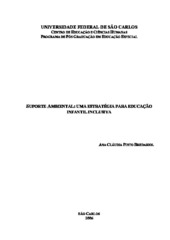Suporte ambiental: uma estratégia para educação infantil inclusiva
Abstract
The physical space of an Institution of necessary Infantile Education to become an
environment, that is, to provide situations that facilitate the interpersonal relations and above
with everything allowed the emergency of diverse forms of expression, the unexpected one,
knowing them spontaneous infantile. In this study the pertaining to school space called
surrounding educational physicist being considered as important curricular element, taking in
account aspects as: elements that condition the organization of the spaces, criteria for one
adjusted organization of the spaces, paper of the educator in the organization of the space and
paper of the educator in the acceptance of the diversity. This study it emphasized educational
- physical environment as an important ally of the inclusive school, where pedagogical
proposals must challenging and be diversified, offering chances of quality for all, also to the
children with educational necessities special. It was considered evaluation of educational the
physical environment as essential for the elaboration and curricular planning, as well as a
facilitator in the educative process. This study it had as objective generality: To investigate
the importance of educational - physical environment in the construction of a proposal
inclusive under the optics of the infantile educator, and was characterized as being descriptive
- exploratory, using as base the qualitative and quantitative analysis of the data. To reach the
considered objective, three distinct stages had been carried through: initial qualification
(establishment of the base line); application of half-structuralized interview (inquiry of the
perception of the educator in relation to educational the physical environment) and application
of a Script pair analysis of educational the physical environment of each participant educator
(evaluation of the quality of the educational environment). 29 educators of public and private
institutions had participated infantile of the city of Uberaba. The joined data had shown that
despite the majority of the professors presenting superior formation, many, they do not
present desirable formation for the development of programs and actions directed to the
inclusive infantile education. It can also be concluded that the educators value the
environment as an important ally in the learning process, but do not identify its functions, the
importance of different resources, the abilities developed from the different space
arrangements, the chances that must be offered. Of one the educators had been general do not
obtain to characterize its educational physical environment although to recognize its
importance in the planning and struturation of its proposal pedagogical. They relate different
acquisitions in the development of the child to the ambient situations, however they do not
present a proposal definite of chances that the access of all facilitates and any child of its
room. The educators had identified the diversities of its populations presents in the
educational environment, however they point insatisfações in the conduction of its action in
result of great groups of children for room, diversity of pupils, professional unpreparedness,
lack of support and precarious conditions of work. One concludes that to think about inclusive
education or proposal that makes possible it, it is a challenge for researchers and educators
who act in the area of Special Education. This challenge still becomes bigger when we deal
with forms to think or to act of professionals who are living deeply in the practical a diversity
of the inclusion, or when we consider changes so that they are taken care of and respected the
peculiarities presented for the diversity. For improvement of the practical ones of intervention
in the education, one becomes necessary that the educator knows to diagnosis the situation
where is inserted and to consider alternative of action, to modernize how much to the new
trends and strategies of education, to establish a vision criticizes regarding its action.
